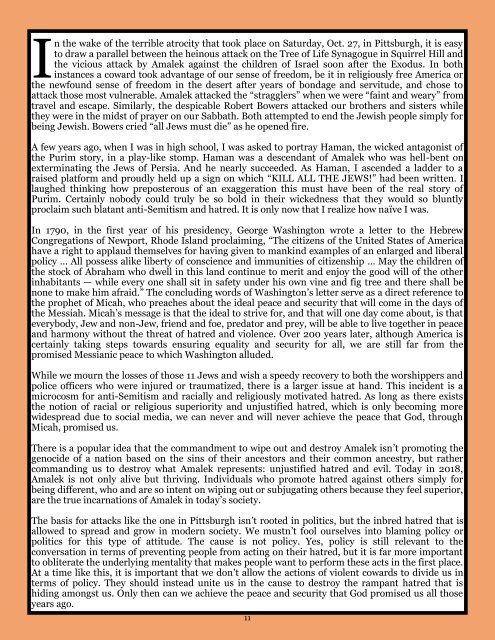Create successful ePaper yourself
Turn your PDF publications into a flip-book with our unique Google optimized e-Paper software.
I<br />
n the wake of the terrible atrocity that took place on Saturday, Oct. 27, in Pittsburgh, it is easy<br />
to draw a parallel between the heinous attack on the Tree of Life Synagogue in Squirrel Hill and<br />
the vicious attack by Amalek against the children of Israel soon after the Exodus. In both<br />
instances a coward took advantage of our sense of freedom, be it in religiously free America or<br />
the newfound sense of freedom in the desert after years of bondage and servitude, and chose to<br />
attack those most vulnerable. Amalek attacked the “stragglers” when we were “faint and weary” from<br />
travel and escape. Similarly, the despicable Robert Bowers attacked our brothers and sisters while<br />
they were in the midst of prayer on our Sabbath. Both attempted to end the Jewish people simply for<br />
being Jewish. Bowers cried “all Jews must die” as he opened fire.<br />
A few years ago, when I was in high school, I was asked to portray Haman, the wicked antagonist of<br />
the Purim story, in a play-like stomp. Haman was a descendant of Amalek who was hell-bent on<br />
exterminating the Jews of Persia. And he nearly succeeded. As Haman, I ascended a ladder to a<br />
raised platform and proudly held up a sign on which “KILL ALL THE JEWS!” had been written. I<br />
laughed thinking how preposterous of an exaggeration this must have been of the real story of<br />
Purim. Certainly nobody could truly be so bold in their wickedness that they would so bluntly<br />
proclaim such blatant anti-Semitism and hatred. It is only now that I realize how naïve I was.<br />
In 1790, in the first year of his presidency, George Washington wrote a letter to the Hebrew<br />
Congregations of Newport, Rhode Island proclaiming, “The citizens of the United States of America<br />
have a right to applaud themselves for having given to mankind examples of an enlarged and liberal<br />
policy … All possess alike liberty of conscience and immunities of citizenship … May the children of<br />
the stock of Abraham who dwell in this land continue to merit and enjoy the good will of the other<br />
inhabitants — while every one shall sit in safety under his own vine and fig tree and there shall be<br />
none to make him afraid.” The concluding words of Washington’s letter serve as a direct reference to<br />
the prophet of Micah, who preaches about the ideal peace and security that will come in the days of<br />
the Messiah. Micah’s message is that the ideal to strive for, and that will one day come about, is that<br />
everybody, Jew and non-Jew, friend and foe, predator and prey, will be able to live together in peace<br />
and harmony without the threat of hatred and violence. Over 200 years later, although America is<br />
certainly taking steps towards ensuring equality and security for all, we are still far from the<br />
promised Messianic peace to which Washington alluded.<br />
While we mourn the losses of those 11 Jews and wish a speedy recovery to both the worshippers and<br />
police officers who were injured or traumatized, there is a larger issue at hand. This incident is a<br />
microcosm for anti-Semitism and racially and religiously motivated hatred. As long as there exists<br />
the notion of racial or religious superiority and unjustified hatred, which is only becoming more<br />
widespread due to social media, we can never and will never achieve the peace that God, through<br />
Micah, promised us.<br />
There is a popular idea that the commandment to wipe out and destroy Amalek isn’t promoting the<br />
genocide of a nation based on the sins of their ancestors and their common ancestry, but rather<br />
commanding us to destroy what Amalek represents: unjustified hatred and evil. Today in <strong>2018</strong>,<br />
Amalek is not only alive but thriving. Individuals who promote hatred against others simply for<br />
being different, who and are so intent on wiping out or subjugating others because they feel superior,<br />
are the true incarnations of Amalek in today’s society.<br />
The basis for attacks like the one in Pittsburgh isn’t rooted in politics, but the inbred hatred that is<br />
allowed to spread and grow in modern society. We mustn’t fool ourselves into blaming policy or<br />
politics for this type of attitude. The cause is not policy. Yes, policy is still relevant to the<br />
conversation in terms of preventing people from acting on their hatred, but it is far more important<br />
to obliterate the underlying mentality that makes people want to perform these acts in the first place.<br />
At a time like this, it is important that we don’t allow the actions of violent cowards to divide us in<br />
terms of policy. They should instead unite us in the cause to destroy the rampant hatred that is<br />
hiding amongst us. Only then can we achieve the peace and security that God promised us all those<br />
years ago.<br />
11



